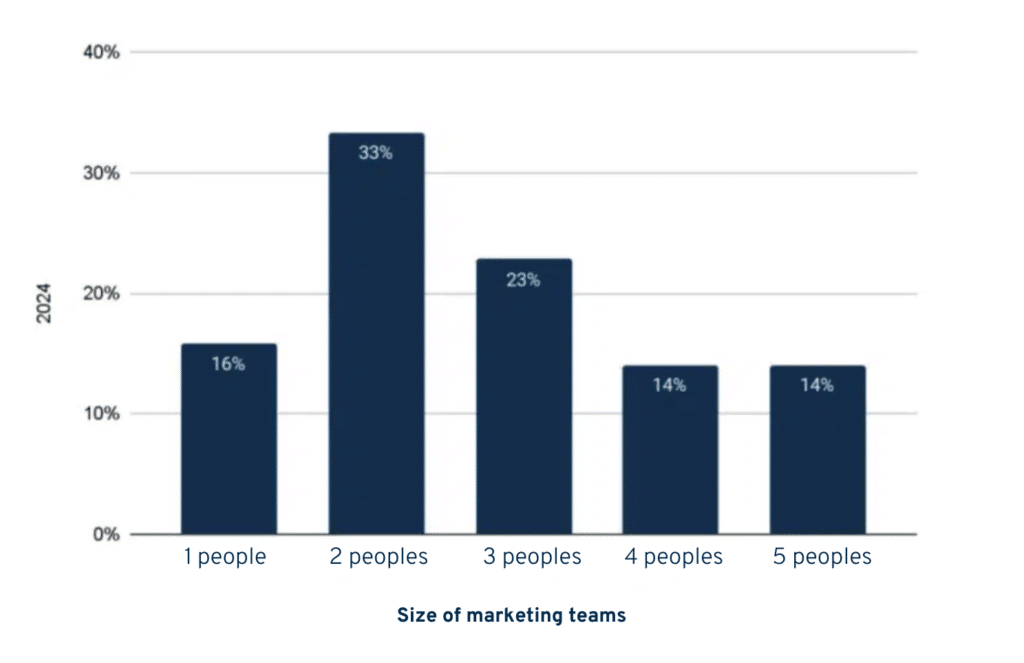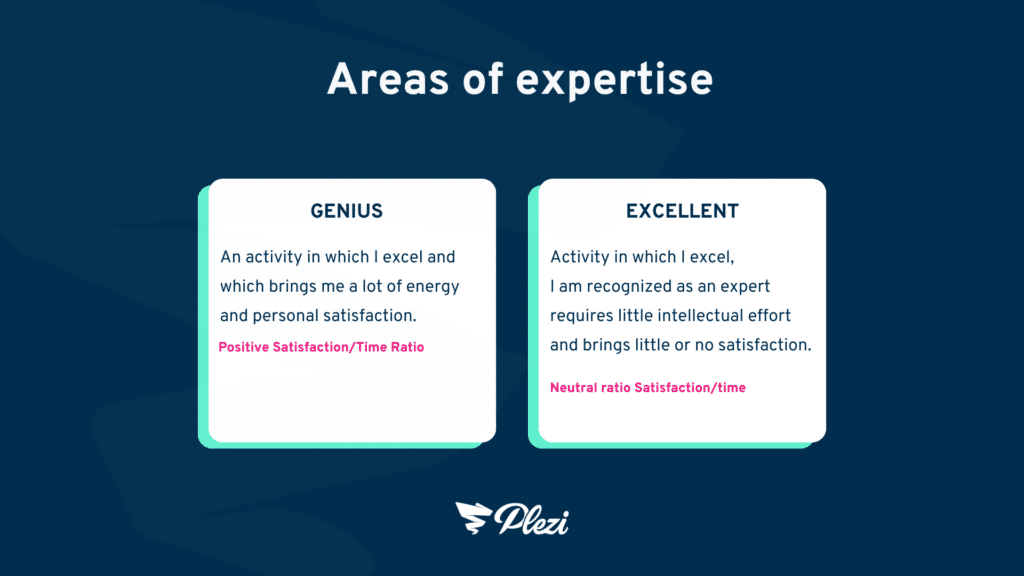Marketing is a constantly evolving field. Since I’ve been Marketing Director at Plezi, I’ve often compared it to the ocean (yes, that’s poetic): there are always new waves breaking. Between emerging technologies, changing customer expectations, new trends to follow (or not)… How do you successfully navigate these waves? And take advantage of favorable currents?
One answer is to stay on the lookout, by developing your marketing skills on an ongoing basis. Far from being a subject solely dedicated to new recruits, skills development is a matter for us too.
So, how do you go about it? Let’s talk about it!
Marketing managers: why prioritize skills upgrading?
Between an arm’s length to-do list, two strategy meetings, three marketing campaigns to validate… Let’s face it: as marketing managers, we rarely have time to get bored. And because our days are so full, we rarely take the time to ask ourselves: when was the last time I took the time to train? To develop new skills? To acquire knowledge I didn’t have before?
Yet these moments are just as important as the meetings to be held, the content to be validated, the teams to be managed and the strategies to be created. As well as adding new strings to our bow, our skills development is also a source of motivation and fulfillment. Why should apprenticeships be reserved for new recruits or more junior profiles? We all have a lot to learn throughout our careers.
But how can we facilitate this rise in skills (without sacrificing our RTT)? I share my advice with you in this article.
Tip 1: Take stock of your skills
List your skills
The first question to ask yourself is: “what skills are essential for you as a marketing manager?”. This initial overview enables us to identify the fundamentals (acquired, or in some cases, skills to be perfected). There are many of these skills, which means that we often have to juggle several missions.
Let’s be honest: we’re real Swiss Army knives, because no matter what the size of the company, marketing teams are generally small. According to our 2024 digital marketing barometer, 73% of B2B companies have marketing teams of between 1 and 3 people.

So, on a day-to-day basis, we have to combine strategy and operations: strategy definition, team management, content creation and so on. We also have to combine traditional levers and “new strategies” (yes, sometimes we invent new jargonous terms to say the same thing). But for all these missions, what skills are required? What weapons do you need?
In answering these questions, we start by identifying our skills, and our level of competence in relation to them.
Identify your “sweet spot”
In tennis, the sweet spot is the precise place to hit the ball so that it comes back with the most force. In business, it’s more or less the same thing: it’s your zone of performance AND fulfillment (or, in other words, the missions you enjoy and where you’re competent). With a little introspection, you’ll be able to identify this zone of genius.
Be careful not to confuse it with the zone of excellence: the sweet spot corresponds to activities that generate energy, personal satisfaction and pleasure. Whereas the zone of excellence requires little intellectual effort, but generates little satisfaction.

Identifying your zone of genius is an important exercise: because we tend to focus too much on our weak points, it allows us (first) to concentrate on our strengths. The benefits?
- It’s good for morale.
- You gain in confidence.
- You capitalize on this “sweet spot”, to develop new skills.
In fact, “improving skills” does not just mean “training where you are less good”. On the contrary!
In his podcast le café du market, Axel Kaletka interviews Selma Chauvin (CMO of Skillup), who encourages us to capitalize on our “” major: whether it’s lead generation, marketing ops, product marketing… Going deeper into the pillar we’ve already mastered is a good initiative, to increase our skills. Then, as Selma explains, the second step is to challenge ourselves on the other pillars we’re less proficient in. Here’s the episode to listen to, which I highly recommend!
Tip no. 2: Keep a watchful eye
Often relegated to the back burner (or rather: the back burner, let’s face it), monitoring is nevertheless a beneficial activity: it enables us to keep abreast of the latest trends.
Every week, I recommend creating a monitoring routine, even for 30/45 minutes.
During these moments of active watch, I read blog articles or newsletters, listen to podcast episodes, decipher the interest of new technologies or trends… And sometimes I even switch off my computer, just long enough to read a few chapters of marketing books. Here are my recommendations:
- Obviously Awesome by April Dunford: to get to grips with the concepts of product positioning and marketing.
- Influence & manipulation by Robert Cialdini: to master the fundamentals of copywriting and the principles of persuasion.
- Dream Team by Ludovic Girodon : to structure your team as a manager.
- Content Marketing – Creating content that sells, by Stéphane Truphème : refine your conversion strategy through content marketing.
- Byron Sharp’s “How Brands Grow” : to shake up preconceived ideas about marketing.
Do you have any other books that you’ve found useful for improving your marketing skills? Share them with us in the comments below this article. In exchange, here are a few tips for organizing your B2B marketing intelligence. It’s a gift!
Tip 3 – Exchange with your peers
In my view, this is the key to gaining perspective and learning, on an ongoing basis. Because you don’t just learn from books, you also learn from your peers! My advice is to list the business professionals who inspire you, then contact them (by finding them on LinkedIn, for example). You can add to this list the marketing managers of larger or more mature companies: you’ll get useful feedback from companies that have been through your current questions or issues.
These exchanges are reassuring, to realize that we’re all going through the same stages: sharing experiences saves us time, and helps us avoid making certain mistakes, in management for example.
To meet peers easily, I also recommend joining communities. In marketing, B2B communities are increasingly numerous. Like the Café du market’ (we’re partners, but also big fans!). As marketers, there’s a wealth of value to be found there: highly enriching discussions, practical advice and a real dynamic of mutual support.
Tip 4: Get coached or mentored
Coaching and mentoring are also a great way to deepen certain skills. It’s a form of transmission that I love: you feel motivated, supported, challenged, pulled upwards… And this form of support breaks the solitude of the manager.
At Plezi, I was very lucky. The marketing team grew quickly after my arrival. To help me take on my role as manager, I benefited from management coaching. The person who accompanied me was available to answer my questions, discuss my issues, provide follow-up… Allowing me to accelerate.
Whether it’s coaching or mentoring, these two forms of support are becoming increasingly popular with marketing managers. They allow you to go further than traditional training, and the follow-up is more personalized.
But you still need to convince your boss to invest: to do this, explain that such support will enable you to improve your skills, which will benefit the whole company. Point out the areas where the company is lagging: product positioning, lead generation, marketing automation… And in your pitch to management, stress the benefits of coaching or mentoring, to improve the company’s overall strategy.
Tip 5: Recruit complementary profiles
Just as it’s important to surround yourself well outside the company, to learn from peers or a coach… It’s just as important to surround yourself well internally, in your team. Your skills development can also depend on the people you work with.
For example, when I was recruited by Plezi, I was carrying out very multi-skilled missions. One of the first recruits to support me was a senior profile, very complementary at best, with a strong appetite for acquisition (SEO/Paid). Today, it’s my turn to recruit profiles that complement each other.
And that’s precisely my advice: recruit complementary marketers who are better than you at certain skills that you don’t master. Don’t be afraid: these people will be able to pass on their knowledge to you.
Another tip? Learn from other internal teams (CSM, sales, product, etc.). Organize meetings to facilitate sharing, but also more informal “off” exchanges, such as cafés or lunches. At Plezi, we’ve tested (successfully!) different formats:
- Structured exchanges during inter-team meetings: for example, a meeting every 2 weeks between sales and marketing staff.
- Breakfast Clubs: one lunch a month with someone from another department in the company.
- PleziTalk: every Wednesday, a Plezian spoke on a particular topic.
- And, of course, all our exchanges in our open space.
Tip no. 6: Don’t limit yourself to theory!
Marketing is a field in which experimentation is key. So why limit yourself to theoretical learning? The best way to really learn and develop your skills is to take action. But you still need to take the time to put it into practice…
Here again, my advice is to set aside time in your CMO agenda. Even if it’s just an hour a week: it’s an hour a week dedicated to your skills development, which can have personal and collective repercussions for the company.
This advice also applies to your teams: what if you all made the commitment to block off time dedicated to skills enhancement (and stick to it!). During this time, teams can apply one of the levers mentioned in this article.
At Plezi, to (really) prioritize the practical application of theoretical learning, here’s what we’ve put in place:
- Implementation is objectified in our marketing plan. Every quarter, one of our team objectives is to test a new action.
- At each weekly meeting with the marketing team, everyone shares their learning from the week (and if possible, their action on it!).
As CMOs, our role is to support the team’s skills development, alongside our own. Obviously, this requires a certain amount of time. And since we can’t be at both ends of the spectrum… Here’s one last piece of advice: choose the right tools.
By equipping yourself with marketing tools like Plezi, you save time, and therefore productivity and efficiency, on various strategic and operational tasks. For example, Plezi helps you deploy a high-performance B2B marketing strategy, thanks to a single tool. From optimizing your contact database to distributing intelligent campaigns, to automatically sending qualified leads to sales reps… the tool frees you from a host of tasks.
On average, marketers who use Plezi gain 1 working week per month… Which can easily be used to meet peers, get coaching, hone skills or test new strategies. And if you’d like to do the same, head over here :




